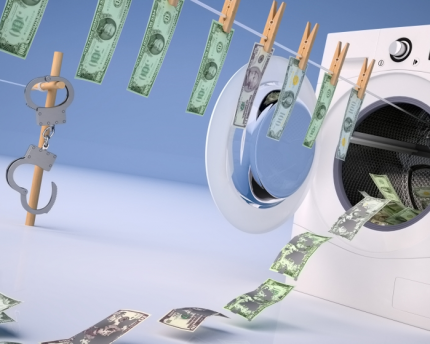What is money laundering?

Prominently, the October 2017 indictment of President Donald Trump's former campaign manager, Paul Manafort, and Manafort's associate, Richard W. Gates III, charges that the two laundered money "through scores of United States and foreign corporations, partnerships and bank accounts."
What does that mean and where does the expression money laundering come from? Here are the basics:
What is the definition of money laundering? The IRS gives us this: “the activities and financial transactions that are undertaken specifically to hide the true source of the money. In most cases, the money involved is earned from an illegal enterprise and the goal is to give that money the appearance of coming from a legitimate source.”
Why is it called laundering? Not surprisingly, the term money laundering was coined during the 1920s gangster era. Kevin Sullivan, director of the Anti–Money Laundering Training Academy, explains how it works in the book, Anti-Money Laundering in a Nutshell (Apress; 2015).
“Between gambling, prostitution, and sales of prohibition alcohol, there was a lot of cash that required laundering. In other words, a method or methods had to be developed so that the government did not become suspicious about the true nature of a gangster’s funds. The major headache that gangsters faced was that the money they ‘earned’ was in the form of cash currency—and often in small-denomination bills or coins. If the funds were put into the bank, then questions would be asked by the bank and ultimately the government. Further, storing large amounts of money in low-value coins is a physical and logistic nightmare. So, the gangsters created businesses, one of which involved slot machines and another of which was laundromats. The coins could be used to 'gamble' and to 'wash clothes' Of course, the number of coins actually used far exceeded the true amount gambled or used at the laundromat, and it was made to appear that more gambling or more clothes were washed than actually were.”
What do you have to do to be guilty of money laundering? It is spelled out by the U.S. Justice Department website: “A defendant must conduct or attempt to conduct a financial transaction, knowing that the property involved in the financial transaction represents the proceeds of some unlawful activity, … and the property must in fact be derived from a specified unlawful activity.”
The prosecutor must prove “either by direct or circumstantial evidence, that the defendant knew that the property involved was the proceeds of any felony under state, federal or foreign law. The prosecutor need not show that the defendant knew the specific crime from which the proceeds were derived; the prosecutor must prove only that the defendant knew that the property was illegally derived in some way.”
Resources:
- Anti-Money Laundering in a Nutshell: Awareness and Compliance for Financial Personnel and Business Managers by Kevin Sullivan (Apress; 2015).
- Anti-Money Laundering Training Academy online.
- U.S. Internal Revenue Service: Overview -- Money Laundering.
- U.S. Department of Justice: Money Laundering Overview.
Related:
Resources: Indictments, plea deals made public
If you would like to comment, like us on Facebook and tell us what you think.

